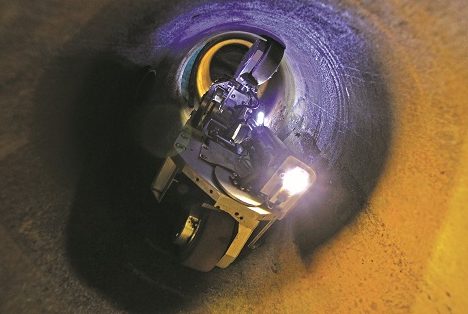Robot helps maintain city’s gas network and reduce traffic disruption

Gas engineers have, for the first time, deployed a robot under the streets of Manchester to inspect and repair the city’s pipe network.
Cadent, which manages the North West’s 21,000-mile gas distribution network, is using Cast Iron Sealing Bot – or Cisbot, for short – under the region’s roads network.
Motorists and pedestrians are just metres above as it works inside mains that stay ‘live’ – so gas continues to flow safely around the robot, and there is no interruption to supply.
The technology is operated remotely by engineers working from a special vehicle to the side of the carriageway, ensuring minimal disruption to road users.
Measuring 12 inches by 35 inches, the robot sends live images back to the team in the control vehicle as it checks every joint and applies a special sealant.
This technology was first used in New York and Boston, and later in London, by Cadent, and Edinburgh. Cadent is also using it in Norwich.
The firm arranged two North West trials late last year, in Oldham and Salford.
Impressed with the results, it has now deployed Cisbot under central Manchester.
In recent weeks the robot has sealed 62 joints in a 240-metre section of gas main under Higher Cambridge Street and 40 joints on a 145-metre section under Loxford Street.
Cadent has identified dozens of similar jobs, in total around 4km of mains, for Cisbot to work on this year. This includes the Mancunian Way and other city centre streets.
Mark Berry, head of customer operations, Cadent, said: “This is amazing technology, allowing us to extend the life of our older gas mains, without disrupting our customers or road users.
“Over time, the joints in these ageing mains naturally start to degrade. If they ever developed a leak and we had to repair them, that would mean digging down and possibly being in situ for weeks at a time.
“For a road like the Mancunian Way, that would be hugely disruptive.
“Cisbot checks all of these joints, one by one.
“It drills holes into them and injects a special sealant. This can extend the life of the main for many decades. Everyday life and travel carries on as normal above it, and the gas network stays safe and sound, as it must be.”
Developed by US company ULC Robotics, whose specialist engineers are carrying out this work in the North West, Cisbot is also being used by Cadent in London and Norwich.
Cadent explained that the robot enters and exits the gas main each day through a sealed launch tube.
There is no risk of a fire or explosion, as the pipes have no oxygen inside them. Using three wheels, Cisbot is able to rotate 360 degrees around the main, drilling into the joints and applying the sealant.
In New York City, the robot was reported to have found a number of foreign objects inside the gas mains, including a baseball and stiletto shoes. It found a 1939 edition newspaper under Boston.
Gas remains a vital part of Manchester’s energy landscape.
More than 80% of the city’s households are heated by gas, as well as schools, hospitals and other buildings.
Many heat-intensive industrial processes depend on gas and it is also the fuel of choice for many HGV fleets.
Cadent is working with Greater Manchester Combined Authority and many other local stakeholders to help bring greener energy to the region.
For example, HyNet North West is on-track to distribute zero-carbon hydrogen to North West homes and to industry by the mid 2020s.
Cadent manages the 21,000 miles of gas mains that run under North West England.
These carry gas safely to 2.7 million properties – from homes and hospitals, to schools, workplaces, industrial sites and HGV fuelling stations.
Working from 14 depots from Kendal to Crewe, including bases in Rochdale, Hollinwood and Bolton, Cadent also provides the North West’s 24/7, 365-day gas emergency service.








